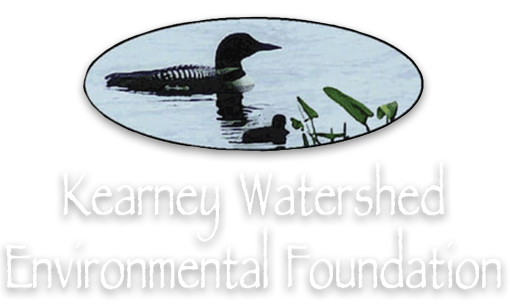February 2023 Newsletter
Watersheds & Wetlands
The Kearney Watershed Environmental Foundation’s mission is to help preserve the quality of air, water, and terrestrial ecosystems of the Almaguin area of the Magnetawan Watershed and help protect this unique natural heritage for generations to come.
Watersheds
The Magnetawan River Watershed flows 175 km from its source in Algonquin Provincial Park, through lakes, rapids and waterfalls, to empty into Georgian Bay at the community of Britt on Byng Inlet.
A healthy watershed conserves water, promotes streamflow, supports sustainable streams, rivers, lakes, and groundwater sources, enables healthy soil for crops and livestock, and also provides habitat for wildlife and plants. Our watershed is important not only for our tourism industry, but for the sustenance of all life. Surface water and storm water runoff within our watershed ultimately drains to other bodies of water. It is essential to consider the downstream impacts of the use of our watershed.
Watersheds are sensitive to pollution and land use. Gravel pits, quarries, mining, pesticide and fertilizer runoff, erosion and logging, and badly maintained septic systems all affect water quality, not only in our lakes and rivers, but in all others downstream. What we do on our land and in our waterways affects our water quality and ultimately quality of all life, both locally and that of our neighbors’ downstream.
Wetlands
A wetland is any area of land that is covered with water for at least part of the year. Four major types of wetlands are recognized in Ontario: marshes, swamps, bogs and fens. Each type is characterized by its own distinctive plant and animal communities.
Benefits of wetlands
Wetlands clean the water that flows through them, recharge underground aquifers and offer protection: from flooding – by reducing water sent downstream, from drought – by holding water when conditions are dry, and from climate change – by reducing greenhouse gases. They protect wildlife by providing hundreds of species with safe places to eat, sleep and raise young.
Plants and animals living in a marsh break down sewage and many chemicals, leaving clean soil and water behind. Ordinary cattails and bulrushes, can absorb fertilizer residues, and poisonous heavy metals like lead and mercury.
Wetlands work like sponges, soaking up rain and melted snow, preventing water from flooding lakes and rivers. Ponds and marshes also reduce the risk of erosion during rainy times, and help keep soil moist during dry times. Wetlands conserve water by feeding underground aquifers.
Canada is home to 25 percent of the world’s wetlands; more than any other country. However, our wetlands are disappearing. Threats to wetlands include urban expansion, infrastructure development, resource extraction and the drainage of wetlands for agricultural production.
Ontario’s Bill 23
Bill 23 or the “More Homes Built Faster Act, 2022” was introduced by the Government of Ontario on October 25, 2022 and passed on November 28, 2022. The bill is intended to spur development and address the province’s need for affordable housing. But critics are concerned that it will instead raise property taxes and threaten protected conservation areas. The bill limits input from citizens and conservation authorities in the approval process for new housing and removes certain environmental protections, opening areas such as Ontario’s Greenbelt to development. While the bill is aimed at Ontario’s urban centres, particularly the Golden Horseshoe, many cottage country communities are concerned about its far-reaching effects.
Source: Cottage Life
Across Ontario, organizations and individuals committed to affordable housing, environmental protection and democracy have been rallying against Bill 23, now enacted as the More Houses, Built Faster Act. Ecology Ottawa is one such organization: www.ecologyottawa.ca. Further information on their rally against Bill 23 can be found here:
Ontario Bill 23 is viewed by many as a disaster for environmental protections, and an attack on wetlands and greenspaces.
Barred Owl
By Doris Villemaire
A barred owl sat on my birch tree for more than an hour and a half. It was looking down at where some sunflower seeds were spilled on the ground, below a bird feeder. He ignored all the chickadees. Obviously, he was waiting for a mouse or vole.
He has a lot of patience when he knows dinner will be coming soon.
Barred owls are usually active during the night hours. But when you are hungry, any time will do. They have weak talons, so small prey is their main meal. They will eat mice, voles, squirrels, and amphibians in summer.
This time of year, when snow covers the ground, it makes it more difficult for these raptors to get a meal. I didn’t see him fly away, so I don’t know if he got his breakfast. Hopefully he did!
